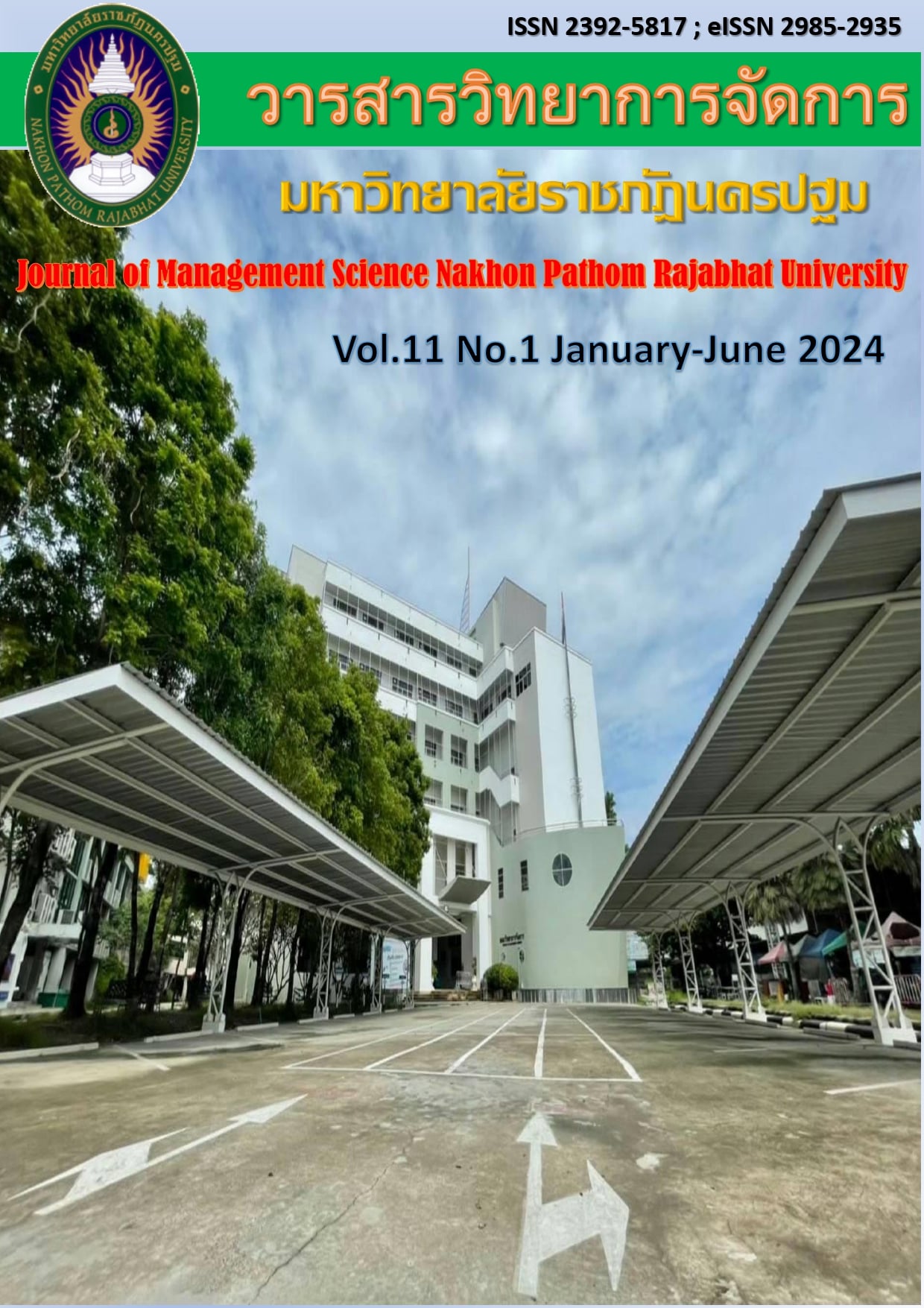The Factor that Affecting Democratic Expression Participation of Generation Z in Bangkok
Main Article Content
Abstract
This study aimed to 1) Investigate the level of democratic expression participation of Generation Z in Bangkok, 2) Study and compare the relationship between personal factors of Generation Z in Bangkok and democratic expression participation, and 3) Study the factors affecting the democratic expression participation of Generation Z in Bangkok. This was a quantitative research study using a questionnaire with a sample is generation Z in Bangkok. The participants were selected through non-probability sampling by Convenience Sampling totaling 400 individuals.
The study found that 1) The democratic Expression Participation of Generation Z in Bangkok had a high average score. 2) There was a statistically significant difference in democratic expression participation based on education, occupation, and monthly income. And (3) The factors affecting the democratic expression participation include compensation and psychological and the equation had a predictive power of 53.10%. The equation can be written as follows
Ytot = 0.129 + 0.063 (Political knowledge) + 0.172 (Psychological) + 0.056 (Perception of political news) + 0.580 (Compensation)
Article history: Received 4 March 2024
Revised 24 April 2024
Accepted 26 April 2024
SIMILARITY INDEX = 11.98 %
Article Details

This work is licensed under a Creative Commons Attribution-NonCommercial-NoDerivatives 4.0 International License.
The views and opinions of the article appearing in this journal are those of the author. It is not considered a view and responsibility of the editorial staff.
References
เฉลียว บุรีภักดี. (2545). การวิจัยชุมชน. กรุงเทพมหานคร: เอส.อาร์.พริ๊นติ้ง แมสโปร-ดักส์.
ชนินธร ม้าทอง. (2560). แนวคิดเกี่ยวกับการสื่อสารทางการเมือง Political Communication Concept. วารสารคณะรัฐศาสตร์และรัฐประศาสนศาสตร์ มหาวิทยาลัยราชภัฏมหาสารคาม, 2 (1), 163-175.
ณัฐภน ลิมปิเจริญ. (2567). การมีส่วนร่วมทางการเมืองในการปกครองระบอบประชาธิปไตยตามการรับรู้ของประชาชน. วารสารสหวิทยาการนวัตกรรมปริทรรศน์, 7(2), 54-69.
ณิชกานต์ สอยโว. (2558). ปัจจัยที่มีอิทธิพลต่อการมีส่วนร่วมทางการเมืองของประชาชน ในเขตเทศบาลตำบลสงเปลือย อำเภอนามน จังหวัดกาฬสินธุ์. วิทยานิพนธ์รัฐประศาสนศาสตรมหาบัณฑิต, มหาวิทยาลัยราชภัฏมหาสารคาม.
วรรณี ปังสกุลยานนท์. (2561). การมีส่วนร่วมทางการเมืองของนักศึกษาระดับปริญญาตรีของมหาวิทยาลัยราชภัฏมหาสารคาม. วิทยานิพนธ์รัฐประศาสนศาสตรมหาบัณฑิต, มหาวิทยาลัยราชภัฏมหาสารคาม.
วิสุทธิ โพธิแท่น. (2551). แนวคิดพื้นฐานของประชาธิปไตย (พิมพ์ครั้งที่ 2). นนทบุรี : สถาบันพระปกเกล้า.
สมพิศ คล้ายวงษ์. (2543). ปัจจัยที่มีผลต่อการมีส่วนร่วมทางการเมืองของผู้มีสิทธิเลือกตั้งอายุ 18-20 ปี. วิทยานิพนธ์รัฐประศาสนศาสตรมหาบัณฑิต, มหาวิทยาลัยรามคำแหง.
สุริยา วีรวงศ์. (2539). ระเบียบวิธีวิจัย: และเทคนิคของการวิจัยเชิงปฏิบัติแบบมีส่วนร่วม. กรุงเทพมหานคร: สถาบันพัฒนาการสาธารณสุขอาเซียน.
โสภา ยอดคีรีย์. (2564). การมีส่วนร่วมทางการเมืองของประชาชนในการพัฒนาท้องถิ่น อำเภอเมืองเชียงใหม่ จังหวัดเชียงใหม่. สารนิพนธ์รัฐประศาสนศาสตรมหาบัณฑิต, มหาวิทยาลัยสยาม.
โอภาส จิตระยนต์. (2565). การมีส่วนร่วมทางการเมืองของประชาชนในเขตองค์การบริหารส่วนตำบลหน้าพระธาตุ อำเภอพนัสนิคม จังหวัดชลบุรี. งานนิพนธ์รัฐศาสตรมหาบัณฑิต. คณะรัฐศาสตร์และนิติศาสตร์ มหาวิทยาลัยบูรพา
Alodat, A. M., Al-Qora’n, L. F., & Hamoud, M. A. (2023). Social media platforms and political participation: A study of Jordanian youth engagement. MDPI Social Sciences, 12(7), 402.
Zakhour, S. (2020). The democratic legitimacy of public participation in planning: Contrasting optimistic, critical, and agnostic understandings. SAGE Planning Theory, 19(1), 1-22.


